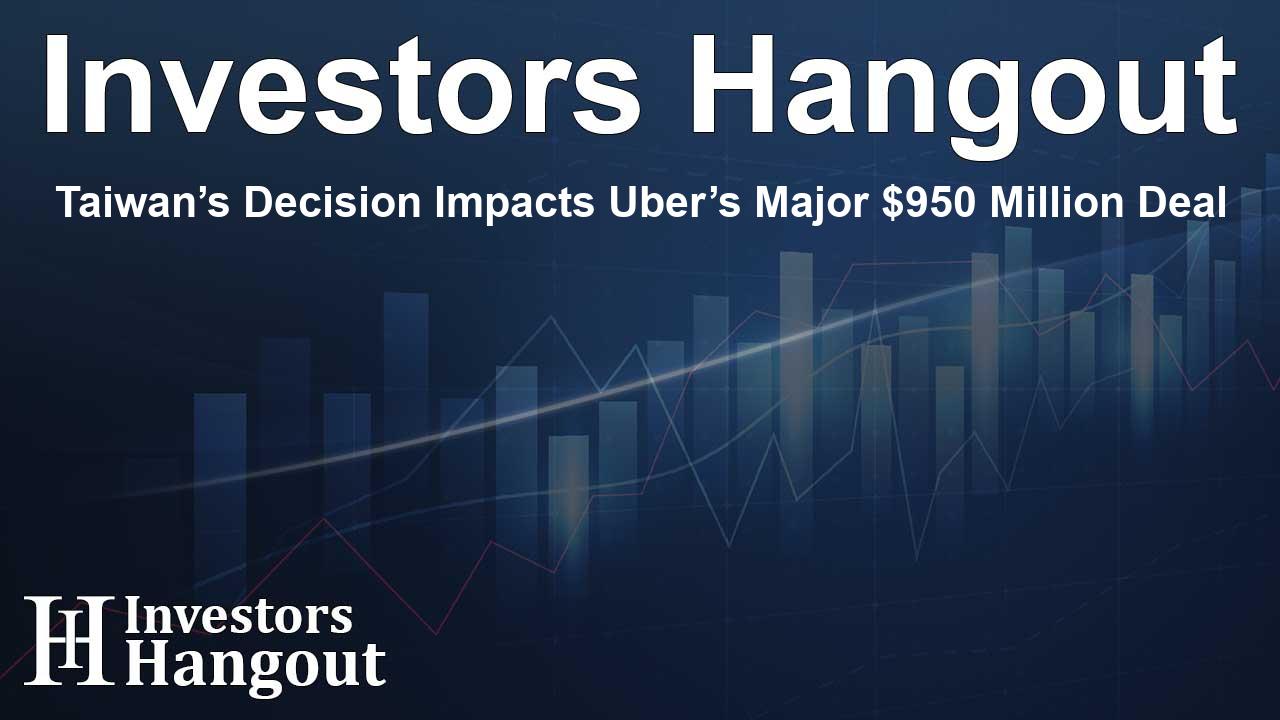Taiwan’s Decision Impacts Uber’s Major $950 Million Deal

Taiwan's FTC Blocks Uber's Acquisition of Foodpanda
Uber Technologies (NYSE: UBER) has faced a significant setback in its plans to acquire Foodpanda's local delivery operations in Taiwan for a substantial $950 million. The decision by Taiwan's Fair Trade Commission (FTC) to halt this acquisition raises concerns about competitive practices within the food delivery market.
Concerns Over Competition
According to the FTC, the main competitive pressure on Uber’s food delivery segment in Taiwan comes from Foodpanda itself. The commission articulated worries that if this competition were to be eliminated, it could result in higher prices for both consumers and restaurants that depend on Uber's services. Such a shift could drastically impact the market landscape, making it crucial for regulatory bodies to scrutinize large acquisitions closely.
Response from Uber
Uber expressed its disappointment following the FTC's announcement, having previously put forth various proposals aimed at alleviating the competition concerns raised by the commission. The challenges posed by this rejection highlight the difficulties large corporations face when attempting to navigate regulation in foreign markets.
Uber's Future Plans in Taiwan
Despite this regulatory hurdle, Uber remains committed to its growth strategy in Taiwan, recognizing it as one of the most promising markets for food delivery services. The company aims to continue investing in local operations while exploring new strategies to enhance user experience and market reach.
Options for Delivery Hero and Uber
Delivery Hero, the parent company of Foodpanda, noted that Uber has not lost all possibilities; they can either appeal the FTC's decision or choose to terminate the proposed deal altogether. Each option carries significant implications for the future of both companies and their operations in the region.
Strategic Importance of the Acquisition
This acquisition was positioned as one of Uber’s most significant international investments, particularly in a country outside of the semiconductor industry. Such acquisitions are pivotal for Uber as it seeks to expand its market share and create a robust delivery network in Asia's competitive food delivery landscape.
Financial Projections of the Acquisition
Uber had anticipated that this acquisition would contribute a minimum of $150 million annually to its adjusted earnings before interest, taxes, depreciation, and amortization within just one year of the deal's closure. This potential boost underscores the financial stakes involved and the strategic motivation behind the acquisition.
Market Dynamics and Future Insights
Foodpanda's operations had reportedly reached a breakeven point in adjusted EBITDA for the fiscal year closing in March 2024. This performance indicates the viability of Foodpanda in the competitive landscape, making it a valuable asset for Uber or any other potential buyers in the food delivery sector.
As Uber navigates this challenging situation, its focus will remain on innovation and adaptation within a rapidly evolving market. Keeping an eye on market trends and regulatory changes will be essential for Uber to secure its position as a leader in the global food delivery industry, especially across Asian markets.
Frequently Asked Questions
What was the main reason for the FTC's decision?
The FTC expressed concerns about potential anti-competitive practices that could arise if Uber acquired Foodpanda, potentially leading to higher prices for consumers.
Is Uber planning to continue investing in Taiwan?
Yes, Uber has expressed its intent to keep investing in Taiwan despite the setback with the Foodpanda acquisition.
What options does Uber have after the FTC's ruling?
Uber can appeal the FTC's decision or choose to terminate the acquisition deal with Foodpanda.
How significant was the proposed acquisition for Uber?
The acquisition was expected to significantly boost Uber's earnings by at least $150 million annually, demonstrating its importance to the company’s growth strategy.
What did Delivery Hero say about the situation?
Delivery Hero noted that Uber has the option to either appeal the FTC's decision or abandon the deal, indicating a proactive approach to navigate the regulatory landscape.
About Investors Hangout
Investors Hangout is a leading online stock forum for financial discussion and learning, offering a wide range of free tools and resources. It draws in traders of all levels, who exchange market knowledge, investigate trading tactics, and keep an eye on industry developments in real time. Featuring financial articles, stock message boards, quotes, charts, company profiles, and live news updates. Through cooperative learning and a wealth of informational resources, it helps users from novices creating their first portfolios to experts honing their techniques. Join Investors Hangout today: https://investorshangout.com/
Disclaimer: The content of this article is solely for general informational purposes only; it does not represent legal, financial, or investment advice. Investors Hangout does not offer financial advice; the author is not a licensed financial advisor. Consult a qualified advisor before making any financial or investment decisions based on this article. The author's interpretation of publicly available data shapes the opinions presented here; as a result, they should not be taken as advice to purchase, sell, or hold any securities mentioned or any other investments. The author does not guarantee the accuracy, completeness, or timeliness of any material, providing it "as is." Information and market conditions may change; past performance is not indicative of future outcomes. If any of the material offered here is inaccurate, please contact us for corrections.